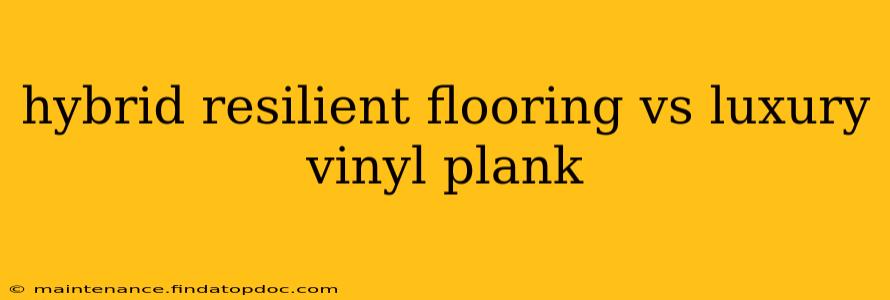Choosing the right flooring can significantly impact the look, feel, and longevity of your home. Two popular options vying for attention are hybrid resilient flooring and luxury vinyl plank (LVP). Both are known for their durability and water resistance, but key differences exist that can influence your decision. This comprehensive comparison will delve into the specifics, helping you make an informed choice for your needs.
What is Hybrid Resilient Flooring?
Hybrid resilient flooring combines the best features of several flooring types. It typically consists of a core layer made from a composite material—often a blend of wood, plastic, or other polymers—topped with a wear layer for protection and a decorative layer that mimics the look of natural materials like wood or stone. This construction offers a balance of durability, water resistance, and aesthetic appeal.
What is Luxury Vinyl Plank (LVP)?
Luxury vinyl plank flooring is a type of vinyl flooring engineered to resemble hardwood planks. It typically features several layers: a wear layer for scratch resistance, a printed decorative layer for the wood grain or stone effect, a core layer (which can be solid vinyl, composite core, or WPC – wood plastic composite), and an underlayment layer in some cases. LVP is prized for its affordability, water resistance, and wide range of style options.
Hybrid Resilient Flooring vs. LVP: Key Differences
While both are resilient and water-resistant, several key factors distinguish hybrid resilient flooring from LVP:
Core Material and Construction:
- Hybrid Resilient: Usually boasts a more rigid core, often a stone polymer composite (SPC) or wood plastic composite (WPC). This contributes to greater stability and dimensional stability, making it less prone to expansion and contraction with temperature changes.
- LVP: Can have a variety of core materials, including solid vinyl, SPC, and WPC. Solid vinyl is typically thinner and more flexible, while SPC and WPC offer more rigidity and stability.
Durability and Scratch Resistance:
- Hybrid Resilient: Generally considered slightly more durable and scratch-resistant due to its harder core and potentially thicker wear layer.
- LVP: Offers good durability, but the scratch resistance can vary depending on the quality and thickness of the wear layer. Higher-end LVP options will rival hybrid resilient flooring in this area.
Water Resistance:
- Hybrid Resilient: Highly water-resistant, often boasting superior protection against moisture compared to standard LVP. This makes it ideal for kitchens, bathrooms, and basements.
- LVP: Also water-resistant, making it suitable for most areas of the home. However, prolonged exposure to standing water can still cause damage.
Cost:
- Hybrid Resilient: Generally more expensive than LVP, reflecting its superior durability and performance characteristics.
- LVP: Typically more affordable, making it a budget-friendly alternative.
Installation:
- Hybrid Resilient: Can be installed via click-lock or glue-down methods, often easier for DIY projects due to the rigidity and stability of the planks.
- LVP: Also available in click-lock or glue-down options. However, the flexibility of some LVP types can make installation slightly more challenging in certain situations.
What type of flooring is better for high-traffic areas?
Both hybrid resilient flooring and LVP are suitable for high-traffic areas, but hybrid resilient flooring often holds a slight edge due to its greater durability and scratch resistance. The thickness and composition of the wear layer significantly impact performance in high-traffic zones.
Is hybrid resilient flooring better than vinyl plank?
Whether hybrid resilient flooring or LVP is "better" depends entirely on individual needs and priorities. Hybrid resilient flooring generally offers superior durability, water resistance, and dimensional stability, justifying its higher cost. LVP provides a more affordable alternative with excellent water resistance and a wide array of styles.
Which flooring is more comfortable underfoot?
The comfort level of both flooring types depends on factors like underlayment and the core material. Some luxury vinyl planks with thicker cushioning layers can offer a more comfortable underfoot experience than certain types of hybrid resilient flooring. However, this is not a universally true statement, and the specific product will determine comfort.
Which flooring is easier to install?
Installation ease varies between specific products and the chosen method (click-lock or glue-down). Generally, hybrid resilient flooring, due to its greater rigidity, might be considered slightly easier to install in click-lock systems for DIYers. However, experience and skill will play a significant role.
Ultimately, the best flooring choice depends on your budget, lifestyle, aesthetic preferences, and the specific requirements of your space. Carefully weigh the pros and cons of hybrid resilient flooring and LVP before making a decision. Consulting with a flooring professional can also provide valuable insights and guidance.
